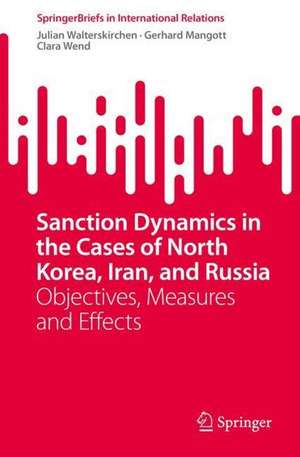Sanction Dynamics in the Cases of North Korea, Iran, and Russia: Objectives, Measures and Effects: SpringerBriefs in International Relations
Autor Julian Walterskirchen, Gerhard Mangott, Clara Wenden Limba Engleză Paperback – 30 noi 2022
Based on detailed empirical evidence, this book investigates the dynamic nature of individual sanctions measures, their multi-layered objectives as a foreign policy tool, their effects on the targeted economies and governments, and how targeted states respond to them. Furthermore, it offers a rare comparative perspective. The book presents a concise summary of the most important aspects and describes some key characteristics that could improve the use of sanctions as a foreign policy tool.
This book will appeal to researchers, scholars, and students of international relations, as well as practitioners and policy-makers interested in a better understanding of the effects of sanction regimes and the improvement of sanctions as a foreign policy tool.
Preț: 343.21 lei
Nou
Puncte Express: 515
Preț estimativ în valută:
65.68€ • 68.32$ • 54.22£
65.68€ • 68.32$ • 54.22£
Carte tipărită la comandă
Livrare economică 15-29 aprilie
Preluare comenzi: 021 569.72.76
Specificații
ISBN-13: 9783031173967
ISBN-10: 3031173961
Pagini: 80
Ilustrații: IX, 80 p. With online files/update.
Dimensiuni: 155 x 235 mm
Greutate: 0.14 kg
Ediția:1st ed. 2022
Editura: Springer International Publishing
Colecția Springer
Seria SpringerBriefs in International Relations
Locul publicării:Cham, Switzerland
ISBN-10: 3031173961
Pagini: 80
Ilustrații: IX, 80 p. With online files/update.
Dimensiuni: 155 x 235 mm
Greutate: 0.14 kg
Ediția:1st ed. 2022
Editura: Springer International Publishing
Colecția Springer
Seria SpringerBriefs in International Relations
Locul publicării:Cham, Switzerland
Cuprins
Chapter 1. Introduction.- Chapter 2. Objectives.- Chapter 3. Measures.- Chapter 4. Effects of Sanctions on North Korea, Iran, and Russia.- Chapter 5. Countermeasures.- Chapter 6. Recent Developments.- Chapter 7. Conclusion.
Notă biografică
Julian Walterskirchen is a research associate at the Kompetenzzentrum Krisenfrüherkennung (Center for Intelligence and Security Studies (CISS)) at the Universität der Bundeswehr, Munich (University of the Federal Armed Forces). Prior, he worked as a research assistant at the University of Innsbruck, Austria, after spending time as a consultant on the prevention of violent extremism at the United Nations Office of Counter-Terrorism, New York, USA. He studied political science and international relations at the University of Innsbruck, Austria, and Essex, United Kingdom. His research focuses on conflict and security studies, quantitative methods, and counterterrorism.
Gerhard Mangott is a professor at the Department of Political Science at the University of Innsbruck, Austria, lecturer at the Department for European Integration at the Donau Universität Krems, Austria, the University of Applied Sciences in Vienna, Austria, and the Diplomatic Academy in Vienna, Austria. His main research interests are foreign and security policies in Russia and the USA, strategic arms control and WMD proliferation, and energy security of the EU in the oil and gas sector.
Clara Wend studied political science and translation studies at the University of Innsbruck. She received her bachelor degrees in 2021 and 2020 respectively, and is currently enrolled in the master’s programme in European and International Studies at the University of Innsbruck. She has worked as a student assistant at the department of political science since 2020.
Caracteristici
Presents an innovative research approach treating sanctions as individual events Includes clear, detailed, and comprehensive diagrams visualizing sanctions imposition over time Examines the entire sanctions life cycle, detailing objectives, imposition, effects, and response




